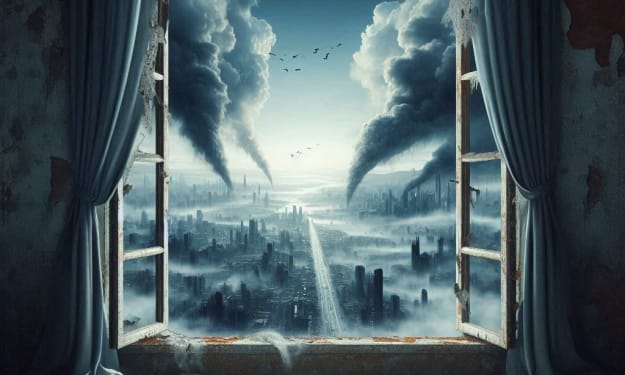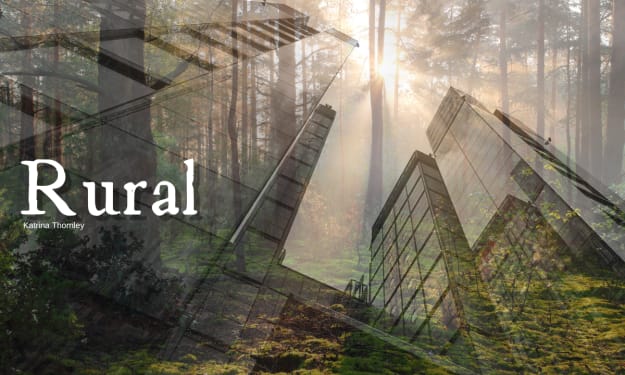
The day dawns darkly, as the days always did. Megalomaniacal autocrats with big red buttons made sure of that, leaving the sky a nuclear-born haze that blocked out the sun. Chris sits on the edge of his bed in the semi-darkness with his head in his hands. The blaring of the alarm clock continues uninterrupted for a minute, and drowns out the nothing in his head. Finally, rubbing his face, Chris sits upright and deliberately pushes the button silencing the alarm. The hum of the generator replaces it, but only serves to underline the quiet of his mind. He doesn’t bother to turn on the light.
He doesn’t have to feel his way to the bathroom; even in the gloom Chris knows the way. He’s lived in this apartment for the last seven years, five of those before the war. He empties his bladder, splashes water on his face from the almost empty gallon, and looks in the mirror. When did he get so haggard? Stupid question. Sallow and sagging skin, dark circles under his eyes, the night’s growth on his chin: he looks like shit. A shave isn’t going to help that. He turns off the tap. The baby is crying.
The baby. They had thought it wouldn’t matter. When the war had finally reached that point, when the bombs went off, they had thought there’d be nothing left. They had thought the world was ending. So they fucked. Natural human reaction. Husband and wife ringing in the end of times like the new year with a good old-fashioned lay. Who needed a condom when you’d be dead tomorrow? When they hadn’t died they didn’t even think about it. The relief and horror at the aftermath was all-consuming. Who would remember that they had anything else to worry about but attempting to contact loved ones and trying to find out whether or not they were alive? Who could think of anything else but sorting through the rubble and waiting for instructions on what to do now?
They hadn’t thought of it. A few months later Marie told him she was pregnant. The infrastructure for procedures like abortions or even prenatal care just didn’t exist anymore. All that was left were Red Cross tents attending to the severely wounded and handing out anti-radiation vaccines. No one knew what to do with a pregnant woman but tell her to pray for a miscarriage or take a fall down some stairs. Marie didn’t miscarry. She said they would figure it out.
Chris listens to the baby cry. “Marie,” he thinks. Oh, Marie. When her water broke, they didn’t really know what to do. Chris had filled the tub with lukewarm water and had Marie lay down. He had some time, he thought. Chris had run down to the nearest Red Cross tent and grabbed the most qualified medic there. “Come with me,” he had said. “You have to come, there’s a baby.”
By the time Chris and the medic had returned to the apartment Marie was screaming. The medic rushed to the bathroom, kneeled next to Marie, told her to open her legs wider, he needed to see. The bathwater was red. Chris sat on the toilet, holding one of Marie’s hands, strangely cold and clammy. The medic yelled for her to push. About thirty minutes later the baby was out, cord wound around its neck. The medic cut the cord with scissors and tore it off the baby. He handed her to Chris with a bulb syringe and yelled “suction her nose and mouth”, and then he pulled Marie’s hips out of the tub and spread her legs wider, trying to see. There was so much blood. The baby was crying. There was too much blood. The baby’s airways had been suctioned and she was crying. Chris was gripping Marie’s hand again, but her grip was so weak. The medic was yelling. The baby was crying. Marie was dying.
There was no look of fear. There was no look of relief. Marie took one last look into his face. There was nothing there for him but naked, unmitigated pity.
“The baby is crying,” Chris thinks. He had named her after Marie. Not her first name, of course. Too morbid. He already wasn’t one for sentiment and he had thought that “honoring the dead” couldn’t be done by naming a child after the mother she had inadvertently killed. But still, Marie lived on through her, in a way. He had wanted to remember that; he wanted to pay homage. So he did it anyway.
But he didn’t, though. He never thought of the child as anything other than “the baby” or “the girl.” He didn’t really know why. She just didn’t seem... real. Like this whole war and the nuclear fallout and the death of his wife had been nothing but a bad dream. The child wasn’t a reminder. She just… didn’t exist as anything more than a concept. And, he guessed, as something he had to feed and bathe and nurture.
How could someone nurture another being in a time and a place such as this? There wasn’t even a fucking sun anymore. For all he knew the sun had exploded too. Somehow things, it, her kept growing; as to how... that was beyond Chris’s reasoning.
He picks up the baby. She needs to be changed and she’s hungry. All very… human things. Sometimes, Chris forgets the baby is human. It seemed unforgivable to him, to forget that, but in a way it was understandable. He barely saw himself as human anymore. It was difficult to empathize with something so small and fragile, especially when all it did was eat, cry, and shit. He changes her and sits down with her at the kitchen table. He turns on the UV lamp and holds her in his lap as he prepares their vitamin injections.
Vitamin D, B12, iron, a cocktail meant to keep them from Rickets, depression, anemia, and he was sure a multitude of other things. The baby didn’t even mind them anymore. They did this every day in front of the lamp. He wasn’t sure it even hurt her anymore. Does she feel anything at all? Does she feel pain? Chris couldn’t anymore, not really, but she was so little and helpless, completely without defenses. Had he and Marie been unforgivably cruel and shortsighted in that impulsive act of love? He barks out a laugh; was this really the time for ethical dilemmas? There were no ethics anymore. There was nothing. There was nothing for him and there was nothing for her, not anymore.
After the injections, he feeds her, dresses her, puts on her hat, and bundles her in a coat. He slips the heart shaped locket he bought for Marie on their first anniversary, when he was still naïve enough to think women liked that sort of jewelry, into the girl’s pocket. The baby is silent. She just watched him with those large eyes set in that pale face. Her little child’s lips always stood out starkly against the white of her cheeks. He thought she cried a lot, but apart from that was a quiet baby. Watchful. She didn’t coo, or giggle, or try to make sounds like “dada” and she wouldn’t know to make sounds like “mama”. She cried when she needed something, because that’s what babies were supposed to do. Otherwise, she was quiet.
Chris packs the baby into the car, fills it sloppily with their precious gasoline, even spilling some, and they go for their morning drive, like they always did. They go to visit Marie. It hadn’t quite been a year since she died, and they still visited her everyday, Chris and the baby.
He carries her through the snow to the grave, and he sits down in front of it with the child in his lap. He doesn’t bother to realize that the child might be cold. He was lost in memories: Marie’s face, those same dark eyes and dark hair, what the sun had felt like on his back on warm mornings, what the world had been like before Marie died, what the world had been like before the war. What was the point? What was the point of any of this?
He looks at the baby in his lap. She senses Chris looking at her and tilts her head up to look at him. She puts her little gloved hand in his and coos, makes talking noises that aren’t really words. She frowns at him for not understanding.
He lays her down in the snow in front of him, on the grave of his wife. He takes off his gloves and puts one hand over the baby’s mouth and nose, the other around her neck. He squeezes. Does she feel pain? Is he unburdening the child or himself? He waits, but an answer does not come. Chris rises from his knees and puts his gloves back on and turns. He leaves the grave, now bearing two, and drives away.
It was weeks before anyone noticed that Christopher Larson was missing. It was even longer before anyone found the frozen little pink bundle at the foot of the grave marked with a cross bearing the name Marie Hope Larson.
About the Creator
Enjoyed the story? Support the Creator.
Subscribe for free to receive all their stories in your feed. You could also pledge your support or give them a one-off tip, letting them know you appreciate their work.





Comments
There are no comments for this story
Be the first to respond and start the conversation.